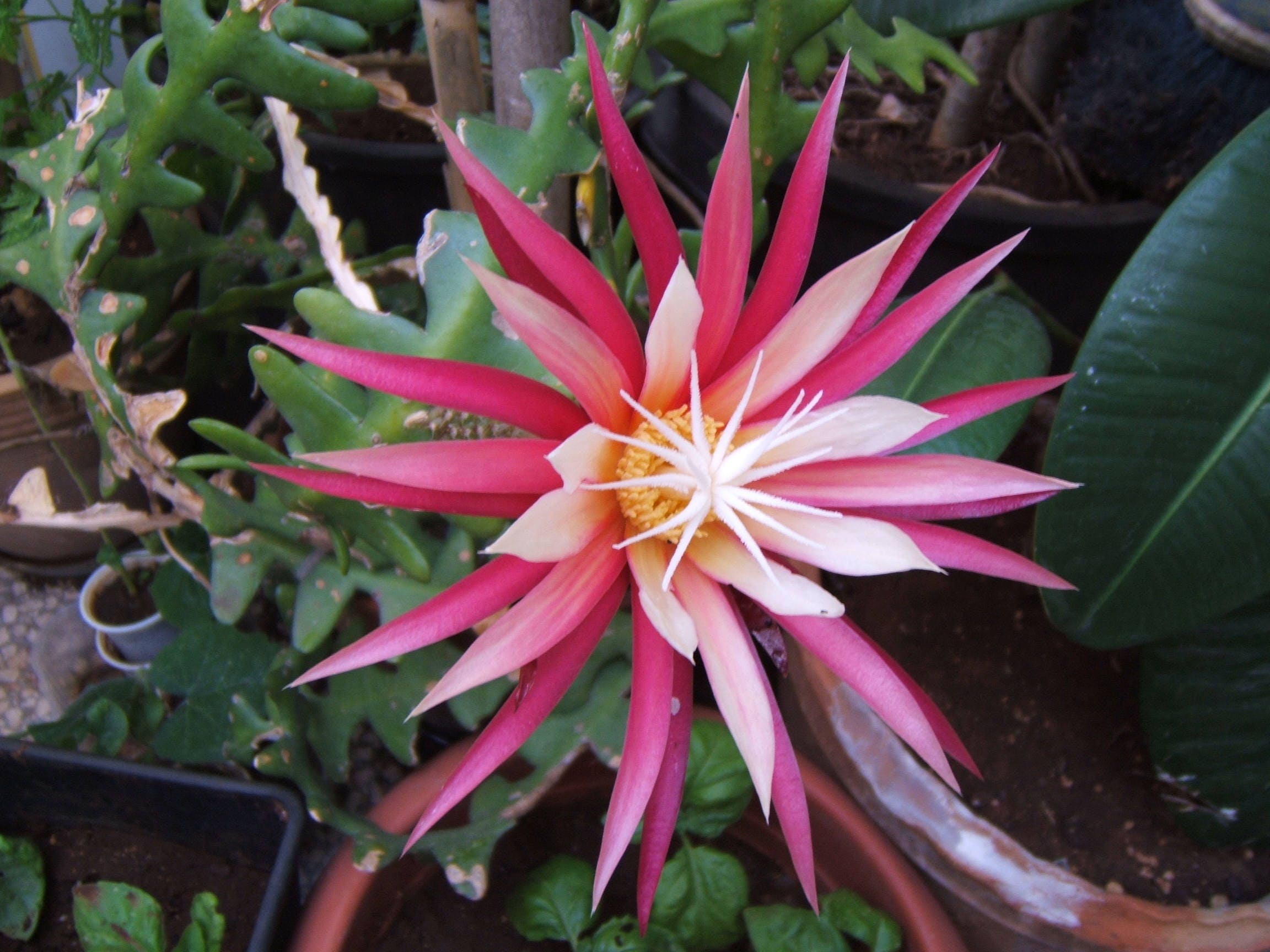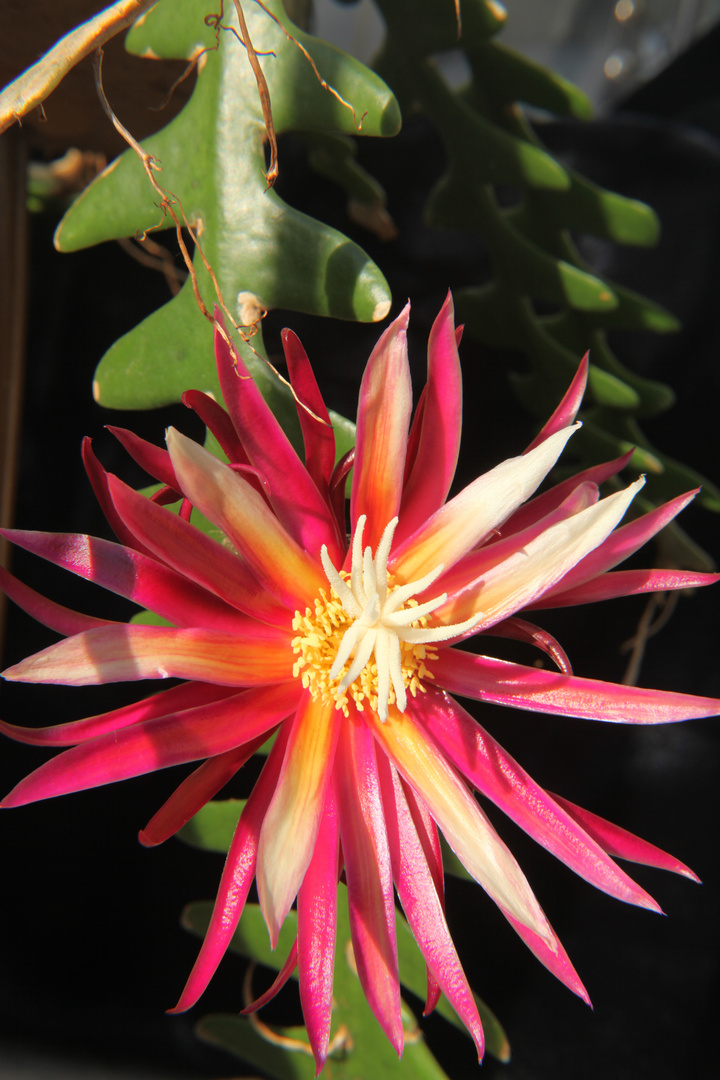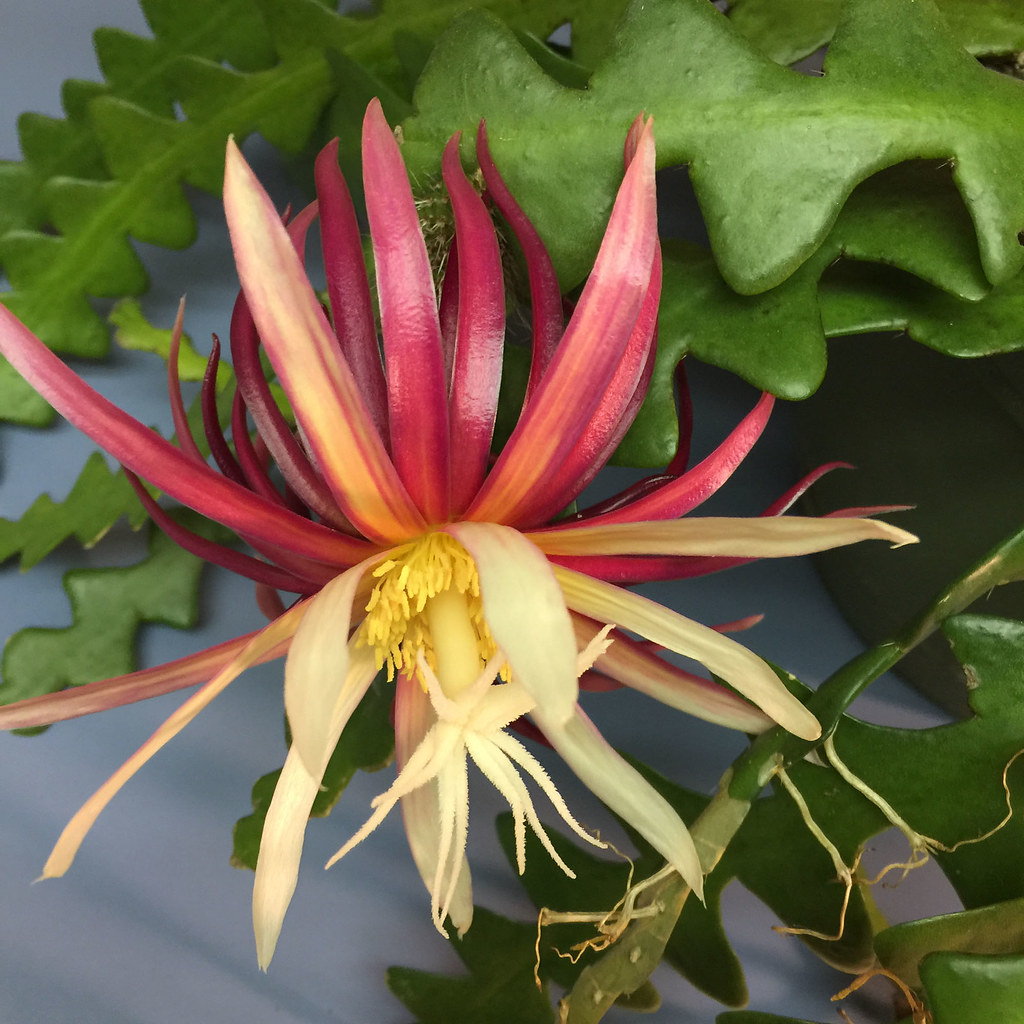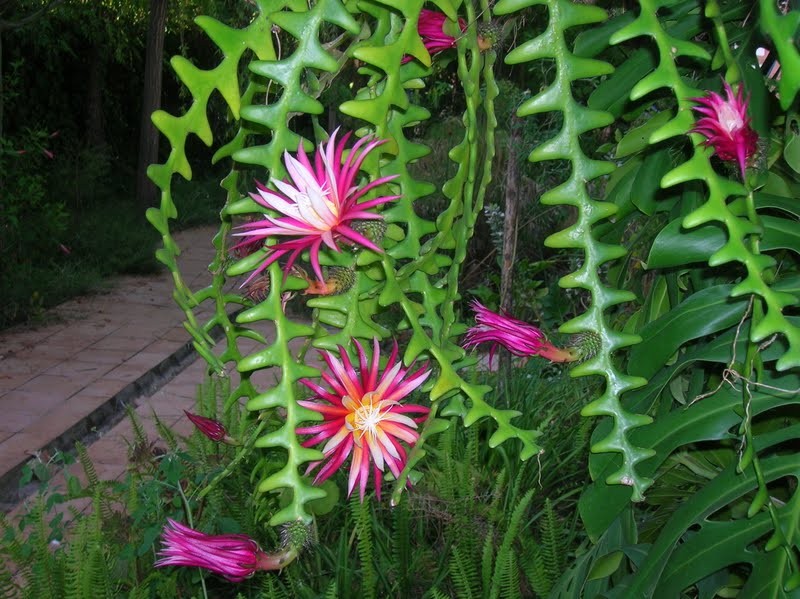Selenicereus Anthonyanus Epiphyllum Plant

Selenicereus anthonyanus
Habit and Cultural Information Category: Succulent Family: Cactaceae (Cactus) Origin: Mexico (North America) Evergreen: Yes Flower Color: Violet Red Bloomtime: Spring/Summer Fragrant Flowers: Yes Synonyms: [Crytocereus anthonyanus] Height: 2-6 feet Width: 4-6 feet Exposure: Cool Sun/Light Shade Irrigation (H2O Info): Medium Water Needs

Selenicereus anthonyanus Greenseasons
Transplant in spring every 3-4 years. Water with lime-free water every 5 days in spring and summer, every 7 days in fall and every 10 in winter. It's important that the ambient humidity is at least 50%; spray the plant 2 times a week. Fertilize every month from mid-spring to late summer with mineral fertilizer for cacti and succulents.

Selenicereus anthonyanus a photo on Flickriver
El Selenicereus anthonynus, known as queen of the night, is a species of cactus native to southern Mexico. It has characteristic green, lobed, almost flat stems that can measure up to 1 or 1 meters long..

Pin on Jardins
Selenicereus anthonyanus (Alexander) D.R.Hunt (formerly Cryptocereus anthonyanus) is a perennial climbing succulent, forming branches in clusters. The stems are flat, like an Epiphyllum, but with alternate projections on each side. The stems can grow up to 50 cm or more, and often curved downwards. It is very difficult to get to bloom, but if one is lucky the results are spectacular, the.
Recregarden SELENICEREUS ANTHONYANUS
Selenicereus Anthonyanus 4.8 out of 5 (5 experiences) Fast grower Survivor Also known as Fishbone Cactus, Fishbone Cactus, Rick rack cactus, Zig-zag cactus, St. anthony's rik-rak and Anacampseros Taxonomy Scientific name Selenicereus anthonyanus Genus Selenicereus Family Cactaceae Order Caryophyllales How to care for Selenicereus Anthonyanus

Selenicereus anthonyanus. Selenicereus anthonyanus, se tra… Flickr
Temperature. The ideal temperature range for growing Selenicereus anthonyanus is between 60-75°F (15.5-24°C). They're not very tolerant of extremes on either end. Anything below 50°F (10°C) will slow down the growth, while 40°F (4.4°C) or colder can lead to damage, and freezing temperatures will kill the plant.

Selenicereus Anthonyanus Epiphyllum Plant
Selenicereus anthonyanus is a fast-growing epiphytic cactus with climbing stems. It branches in clusters at intervals along the stem. The unusual leaf-like branches are green, up to 3.3 feet (1 m) long, and 6 inches (15 cm) wide. They have up to 2 inches (5 cm) long and up to 0.5 inches (1.3 cm) wide lobes tapered towards the rounded apex.
Recregarden SELENICEREUS ANTHONYANUS FLORECE
Temperature and humidity are crucial factors in successfully growing Selenicereus plants. Most species prefer temperatures between 60°F and 80°F (15°C to 27°C) during the growing season, with a slight drop in temperature at night. As for humidity, providing moderate levels, around 40% to 60%, will help replicate their native environment.
cactusmania SELENICEREUS ANTHONYANUS
Description Selenicereus anthonyanus: An evergreen cactus / succulent with green foliage and white, pink and red flowers in spring and summer. Attractive to hummingbirds. To grow well, it prefers mostly sun - mostly shade and regular - low water. Drought tolerant once established. Grows best in well-drained soil.

Selenicereus anthonyanus Foto & Bild pflanzen, pilze & flechten
Selenicereus anthonyanus fishbone cactus hails from Mexico's tropical rainforests and loves humid & moist environments. This epiphytic cactus is an easy-to-care species and a perfect choice for freshers in horticulture.
Recregarden SELENICEREUS ANTHONYANUS
The scientific name for the plant is Cryptocereus anthonyanus (syn. Selenicereus anthonyanus ), and is a member of the night blooming cactus family. Best known for its long, arching stems coated with serrated leaf nodes, fishbone cactus is found in its habitat in groups, which hang from trees.

20170430_1229i_Selenicereus_anthonyanus Selenicereus ant… Flickr
Selenicereus anthonyanus. Flower of Selenicereus anthonyanus. Photo courtesy of Paul Kaluschke. A native of Chiapas, Mexico, Selenicereus anthonyanus is one of a fairly small group of epiphytic cacti. The strange habit of S. anthonyanus suggests that throughout many thousands of years the climate of the area in which it resided changed from an arid environment to a more tropical environment.

Selenicereus anthonyanus ZielonyParapet
Cultivation. Grow in hummus-rich, well-drained soil and apply a cactus feed during the spring and summer months. Water regularly during the growing season but sparsley in the winter months, allowing the top of the soil to dry out between waterings. Re-pot every other year. Prefers a temperature of between 16°C and 24°C and no lower than 4°C.
Selenicereus anthonyanus (Cactaceae) image 34538 at
Description: Selenicereus anthonyanus (formerly Cryptocereus anthonyanusSN|10701]]SN|10701]]) is a perennial climbing succulent, forming branches in clusters. The stems are flat, like an Epiphyllum, but with alternate projections on each side. The stems can grow up to 50 cm or more, and often curved downwards.
Recregarden SELENICEREUS ANTHONYANUS
Fish Bone Cactus (Selenicereus anthonyanus) is an ornamental plant because of its nocturnal flowers and unusual, leaf-like stems. It is a fast-growing, epiphytic, scandent or climbing cactus that branches along a notched narrow stem. It produces green, up to 1 m long and up to 15 cm wide, flat branches. They have up to 5 cm long and up to 1.3.
Recregarden SELENICEREUS ANTHONYANUS
Selenicereus anthonyanus is a cactus species native to southern Mexico. It is grown as an ornamental because of its nocturnal flowers and unusual, leaf-like stems. Common names include fishbone cactus, rickrack cactus, zig-zag cactus and St. Anthony's rickrack, and is sometimes referred to as an orchid cactus.